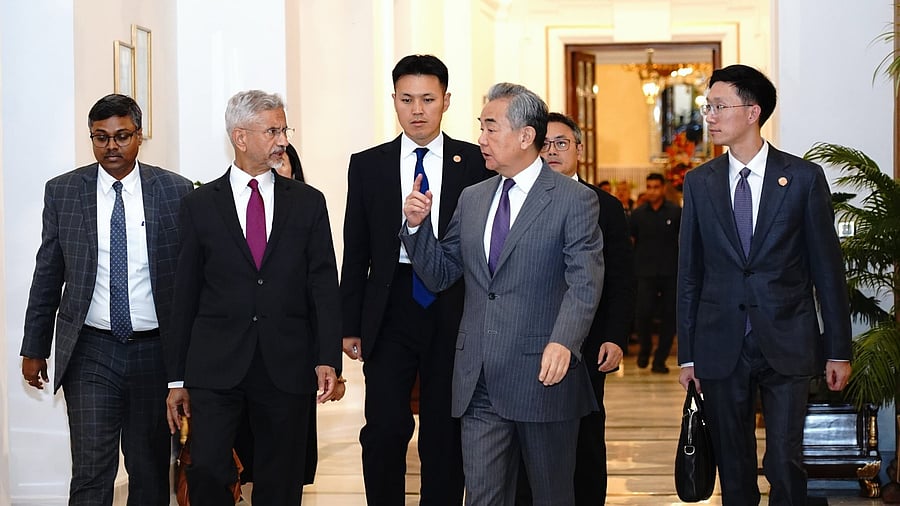
MEA S Jaishankar with China's Wang Yi in Delhi.
Credit: X/@DrSJaishankar
New Delhi: Any positive momentum in India-China relations will be based on peace along the disputed boundary between the two nations, External Affairs Minister S Jaishankar told his counterpart in the communist country, Wang Yi, on Monday.
Ahead of the 24th round of boundary negotiations between India and China, New Delhi also nudged Beijing to expeditiously withdraw nearly 100,000 additional troops the Chinese People’s Liberation Army had deployed along its Line of Actual Control (LAC) with India.
Wang and National Security Advisor Ajit Doval, the current special representatives of China and India, would hold the 24th round of boundary negotiations in New Delhi on Tuesday. “This (boundary negotiation) is very important because the basis for any positive momentum in our ties is the ability to jointly maintain peace and tranquillity in the border areas,” Jaishankar told Wang at a meeting held soon after the arrival of the foreign minister of China on Monday. “It is also essential that the de-escalation process move forward.”
Jaishankar noted that India-China relations went through a difficult period – indirectly referring to the military stand-off which had started along the LAC in eastern Ladakh in April-May 2020 and continued till October 2024. “Our two nations now seek to move ahead. This requires a candid and constructive approach from both sides.”
“In that endeavour, we must be guided by the three mutuals - mutual respect, mutual sensitivity and mutual interest,” the external affairs minister told his counterpart from the neighbouring communist country, adding: Differences must neither become disputes, nor competition, nor conflict.
Mao Ning, the spokesperson of the Ministry of Foreign Affairs of the government of China said that Beijing was willing to take the opportunity of Wang's visit to New Delhi to work together with the India in implementing the important consensus reached by the leaders of the two countries, maintain the momentum of high-level exchanges, enhance political mutual trust, strengthen practical cooperation, properly manage differences, and promote the sustained, healthy, and stable development of China-India relations.
The stand-off along the LAC in eastern Ladakh had started in April-May 2020 with the aggressive deployment of a large number of troops by the Chinese People’s Liberation Army along the disputed boundary between the two nations, and the Indian Army responding with counter-deployment. The stand-off, which reached a flashpoint with a violent face-off in Galwan Valley on June 15, 2020, continued till October 21, 2024, when the two sides could finally clinch a deal for disengagement or withdrawal of frontline troops from Depsang and Demchok. A meeting between Prime Minister Narendra Modi and President Xi Jinping on October 23, 2024, at Kazan in Russia, endorsed the deal as the end of the stand-off.
Jaishankar, while informing Parliament on December 3, 2024, about the latest India-China deal, had stated that disengagement or withdrawal of additional troops from along the LAC would be the next priority for both sides.
The two sides, however, could not make much progress on the disengagement, despite the resumption of the negotiations between Special Representatives to resolve the protracted boundary dispute in December 2024. Though the mutual withdrawal of frontline troops from the face-off points was completed, China did not pull back its soldiers from the “rear areas”, forcing India to maintain the same level of deployment.
The 1993 and 1996 agreements between India and China required both sides to refrain from amassing large numbers of troops in the border areas, to abide by and respect the LAC strictly and to avoid taking any unilateral action to alter it.
“The fight against terrorism in all its forms and manifestations is another major priority. I look forward to our exchange of views,” Jaishankar told Wang.
Beijing’s support to Islamabad during the escalation of India-Pakistan tension in April-May this year riled New Delhi.
Jaishankar and Wang also discussed economic and trade issues, pilgrimages, people-to-people contacts, river data sharing, border trade, connectivity and bilateral exchanges.
